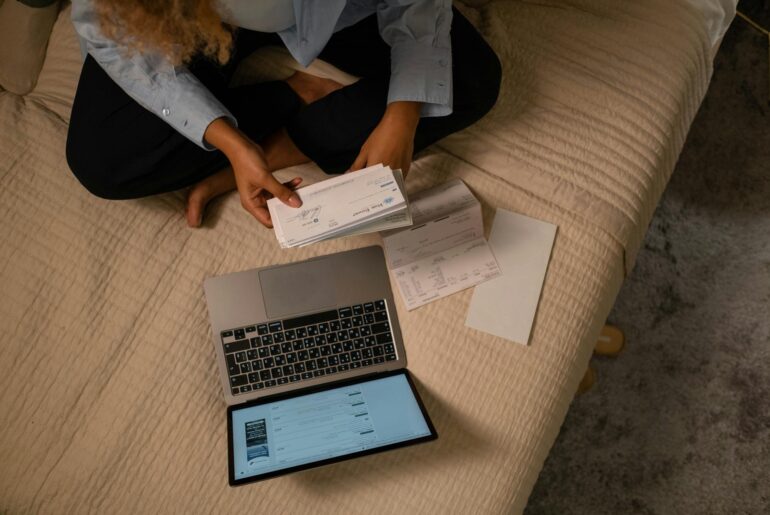This article may contain references to products or services from one or more of our advertisers or partners. We may receive compensation when you click on links to those products or services. Nonetheless, our opinions are our own.
The information presented in this article is accurate to the best of our knowledge at the time of publication. However, information is subject to change, and no guarantees are made about the continued accuracy or completeness of this content after its publication date.
It can be hard to keep track of your money, especially when you have to deal with the details of your checking account. It may seem like a simple tool for everyday transactions, but there are common mistakes that can cost you money, make it hard to stick to your budget, and make you angry. Knowing about these mistakes will help you avoid making expensive ones and improve your overall financial health. It’s important to know about these mistakes so you can take charge of your banking experience, whether you’re new to managing a checking account or have been doing it for years.
- Hidden Fees That Can Drain Your Checking Account
- Why Regularly Reviewing Your Statements Matters
- The Consequences of Treating Your Checking Account Like a Savings Account
- The Risks of Relying on Overdraft Protection
- The Pitfalls of Impulsive Transfers Between Accounts
- How Setting Up Alerts Can Help You Stay on Track
- Conclusion
- Frequently Asked Questions
- What are the most common hidden fees in a checking account?
- How can I avoid paying unnecessary bank fees?
- Why should I review my bank statements regularly?
- What’s wrong with keeping too much money in my checking account?
- How can overdraft protection be risky?
- How can I avoid relying on overdraft protection?
- Why are impulsive transfers between accounts a problem?
- How can I prevent impulsive transfers?
- What kinds of alerts should I set up on my checking account?
- What’s the overall best way to manage a checking account?
- Recommended Reads
A lot of people only pay attention to the balance in their account, but it’s just as important to know about extra fees that could be quietly taking your money. Not only do you need to keep track of your deposits and withdrawals when you manage a checking account, but you also need to know about possible fees that could affect your money. Some common hidden fees to look out for include:
- Monthly Maintenance Fees: Some banks charge a monthly fee unless certain conditions are met, like keeping a minimum balance.
- ATM Fees: Using ATMs that aren’t in your network can cost you money in fees that add up quickly.
- Overdraft Fees: If you go over your account limit, you could have to pay a lot of money for each transaction.
- Foreign Transaction Fees: Your bank may charge you extra fees if you travel or buy things from sellers in other countries.
Being proactive about learning about these fees and how to avoid them can save you a lot of money. To stay up to date, check your account’s terms and conditions often and keep an eye on your account activity.
Why Regularly Reviewing Your Statements Matters
One of the most important things you can do to keep track of your money is to regularly look over your financial statements. It’s not just about finding mistakes or differences; it also helps you keep track of your spending and better manage your budget. You can make better financial decisions, find mistakes early, and make sure you know about any unauthorized transactions by checking your bank statements regularly. Some important reasons to make this a regular practice include:
- Catching Errors: Mistakes happen at banks, and if you don’t check your statements, you might miss charges that aren’t right or transactions that happen more than once.
- Fraud Detection: Finding fraud early can save you time and money.
- Budgeting Insights: Looking at your account regularly can help you find places where you can cut back on spending or change how you spend your money.
- Financial Empowerment: Knowing where your money goes helps you make better decisions about your money.
Set aside time each month to look over your account statements to make this easier.
The Consequences of Treating Your Checking Account Like a Savings Account
It’s easy to keep money in your checking account for convenience, but doing so could make it harder to reach your financial goals. Compared to savings accounts, checking accounts usually don’t pay much interest. This means that your money isn’t growing as quickly as it could in a savings account.
Also, using your checking account to save money can make you bad at budgeting. If you don’t set aside money for spending and saving, you might use your savings to pay for everyday things, which would leave you unprepared for unexpected costs. To better manage your finances, consider:
- Maintaining a distinct separation between your spending and savings accounts.
- Setting savings goals to keep your funds intact.
- Utilizing a high-yield savings account to help your money grow.
You can better protect your savings and reach your financial goals if you pay more attention to how you use your accounts.
Voted "Best Overall Budgeting App" by Forbes and WSJ
Monarch Money helps you budget, track spending, set goals, and plan your financial future—all in one app.
Get 50% OFF your first year with code MONARCHVIP
The Risks of Relying on Overdraft Protection
Overdraft protection can be a useful safety net when money is tight, but you should be careful when using it. If you depend too much on overdraft protection, you might feel safer than you really are and spend too much. A lot of people think they can take out more money than they have in their account without any problems. But because of high overdraft fees and poor management, this can quickly turn into a cycle of debt.
Overdraft protection can be problematic in the following ways:
- Fees Can Add Up: Every time you use an overdraft, you usually have to pay a big fee, which can add up quickly and empty your account.
- Encourages Financial Mismanagement: Overdraft protection might make you want to spend more than you can afford, which makes it hard to stick to a budget.
- Credit Risk: Using overdraft protection too much could hurt your credit score.
To avoid this mistake, check your account balance often and make sure you know how your bank’s overdraft protection works.
The Pitfalls of Impulsive Transfers Between Accounts
One of the sneakiest things that can happen when you manage your checking account is making an impulsive transfer. When you have an unexpected expense or want to buy something on a whim, it’s easy to move money between accounts. But these quick choices can cause overdraft fees you didn’t expect or get in the way of your savings goals. To avoid this, consider the following tips:
- Set Up a Buffer: You won’t have to move money from your savings if you keep a cushion in your checking account for unexpected costs.
- Create a Transfer Schedule: Instead of moving money between accounts on a whim, set up a regular schedule for doing so.
- Use Alerts: Set up alerts for low balances to remind you to think twice before sending money.
By using these tips, you can learn to be more disciplined with your money and keep your accounts balanced and predictable.
How Setting Up Alerts Can Help You Stay on Track
Setting up alerts for your checking account can help you keep an eye on your spending, keep track of your account balances, and avoid making expensive mistakes. You can choose the types of alerts that are most useful to you because many banks let you customize notifications by text or email. Some alerts to consider setting up include:
- Balance Alerts: Receive a notification when your account balance drops below a set amount.
- Transaction Alerts: Get updates whenever a transaction exceeds a specified amount, helping you keep track of larger purchases.
- Fee Alerts: Stay informed about any service fees, so you can take action before they affect your balance.
- Deposit Alerts: Know when new funds are deposited into your account, making it easier to manage your budget.
You can avoid extra fees and better manage your money by keeping an eye on what’s going on with your account.
Conclusion
To handle your checking account well, you need to be aware, organized, and disciplined. You can greatly improve your financial health by being aware of hidden fees, checking your statements often, setting up alerts, and not making transfers on a whim. Also, keeping your savings and spending accounts separate and using overdraft protection carefully will help you make better choices and stay out of trouble with your money. You will be better able to make smart financial decisions and keep your money on track if you take charge of these parts of your banking.
Frequently Asked Questions
Common hidden fees include:
Monthly maintenance fees (often waived with a minimum balance or certain activity)
ATM fees for using out-of-network machines
Overdraft fees for exceeding your balance
Foreign transaction fees when using your card internationally
How can I avoid paying unnecessary bank fees?
Check your account’s terms and conditions often, use ATMs that are part of your network, keep the required balance, and set up alerts to let you know when your balance is getting too low.
Why should I review my bank statements regularly?
Regularly reviewing your statements helps you:
Catch bank errors or duplicate charges
Detect fraudulent activity early
Identify spending patterns for better budgeting
Stay informed about your overall financial health
What’s wrong with keeping too much money in my checking account?
Most of the time, checking accounts don’t pay much interest, so your money isn’t growing. It’s best to only keep the money you need for spending and put the rest in a high-yield savings account so your money can grow.
How can overdraft protection be risky?
Overdraft protection can:
Lead to expensive fees if used often
Encourage overspending beyond your available balance
Potentially hurt your credit if mismanaged
How can I avoid relying on overdraft protection?
Keep a close eye on your balance, set up alerts for when your balance gets low, and keep a small amount of money in your checking account for emergencies.
Why are impulsive transfers between accounts a problem?
Frequent, unplanned transfers can:
Trigger overdraft fees
Disrupt your savings goals
Create a habit of using savings for nonessential expenses
How can I prevent impulsive transfers?
Keep a buffer in your checking account
Schedule regular transfers instead of making them on the spot
Use alerts to think twice before moving funds
What kinds of alerts should I set up on my checking account?
Useful alerts include:
Low-balance alerts to avoid overdrafts
Transaction alerts for large purchases
Fee alerts to catch and address charges quickly
Deposit alerts to track when funds arrive
What’s the overall best way to manage a checking account?
Be aware of fees, check your statements often, keep your savings separate from your spending, use overdraft protection carefully, limit transfers that are made on a whim, and set up alerts to see what’s happening in real time.

Reviewed and edited by Albert Fang.
See a typo or want to suggest an edit/revision to the content? Use the contact us form to provide feedback.
At FangWallet, we value editorial integrity and open collaboration in curating quality content for readers to enjoy. Much appreciated for the assist.
Did you like our article and find it insightful? We encourage sharing the article link with family and friends to benefit as well - better yet, sharing on social media. Thank you for the support! 🍉
Article Title: Avoiding Common Checking Account Mistakes
https://fangwallet.com/2025/08/15/avoiding-common-checking-account-mistakes/The FangWallet Promise
FangWallet is an editorially independent resource - founded on breaking down challenging financial concepts for anyone to understand since 2014. While we adhere to editorial integrity, note that this post may contain references to products from our partners.
The FangWallet promise is always to have your best interest in mind and be transparent and honest about the financial picture.
Become an Insider

Subscribe to get a free daily budget planner printable to help get your money on track!
Make passive money the right way. No spam.
Editorial Disclaimer: The editorial content on this page is not provided by any of the companies mentioned. The opinions expressed here are the author's alone.
The content of this website is for informational purposes only and does not represent investment advice, or an offer or solicitation to buy or sell any security, investment, or product. Investors are encouraged to do their own due diligence, and, if necessary, consult professional advising before making any investment decisions. Investing involves a high degree of risk, and financial losses may occur including the potential loss of principal.
Source Citation References:
+ Inspo
There are no additional citations or references to note for this article at this time.












































